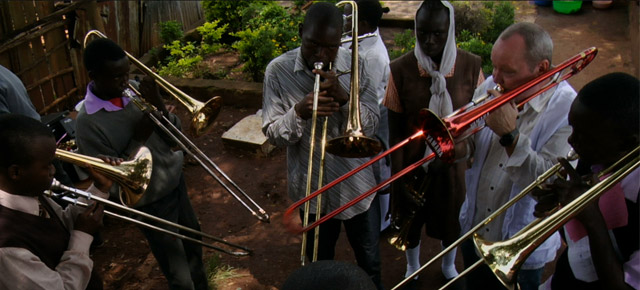Acclaimed jazz artist, Nils Landgren, first started to support Medecins Sans Frontieres (MSF) in 1994, when he took part in a charity concert in support of the organisation’s work in Rwanda. Since then, his collaboration with MSF has grown, with Nils and his band forming the initiative, Funk for Life, which raises money for MSF through album sales and aims to inspire achievement in children through music.

Nils and his band, The Nils Landgren Funk Unit, first travelled to Kibera, which is one of Africa’s largest slums, in 2009. As well as donating musical instruments and teaching children how to play, the band performed at the opening ceremony for a new MSF clinic in the Kenyan slum. They have maintained a link with the community since then, and will return again later this month to perform at a concert timed to coincide with the handover of the clinic from MSF to the Nairobi City County Health Services.
“I first got involved with MSF more than twenty years ago, but the collaboration really took off when me and the guys in my band, the Nils Landgren Funk Unit, organized a concert to support the 15th anniversary of MSF in Sweden. We all admired the work that MSF was doing, but we’re not doctors or nurses, so we wanted to try to contribute through our music. So, we put on a concert, and all of the money from the ticket sales went to MSF.
The experience made us want to take the collaboration further, beyond just raising money, and after many long discussions we came up with the idea of starting a music project for kids. I hoped we could encourage young kids to move forward through music. Not only is music a means of communication, I think it has an incredible capacity to show people what they can achieve, through something as simple as holding an instrument.
Together with the members in my band, I set up a charity initiative called Funk for Life. As well as raising money specifically for a new clinic that MSF was building in Kibera, we would give musical instruments to children in the local community and teach them how to play.
Going to Kibera for the first time was a totally overwhelming experience; none of us had been in such a different environment before. There was almost no water, electricity or sanitary facilities. At the same time, in the middle of all of this poverty and misery, we saw proud people who were doing the best with what they had. Whatever difficulties people were coping with they had pride and dignity. This was a real lesson for us.
Visiting MSF’s clinics was also a real eye opener; the facilities were simple, but even in those conditions, the doctors and nurses really could do wonders.
I was unsure how interested the children would be in the musical instruments. In one of our first days I noticed a group of children who could not take their eyes off my trombone. I asked if they wanted to play it, but they were all too shy. I could see that one girl in particular was interested, but she did not dare. When she finally picked up the trombone she managed to get a sound out of it. After that, they all wanted a go. The children went from not wanting to touch the instruments, to not wanting to put them down.
As it turned out, there were a lot of kids in Kibera who were very interested in trying to understand how instruments worked. We also recorded some of the children singing, which featured on the title track of our album, “Funk for Life”, that raised money for MSF.
The second time I went to Kibera, we were doing an instrument presentation to children from seven schools under a big tree. We soon started playing together; even people who have never held an instrument before can usually start to play something in a relatively short time.
Whilst we were playing, a small girl handed me a note. It said that she wanted to go to school. A little later, I saw her sitting on the red earth, looking really gloomy, with a shiny silver flute in her hand. I asked her what was wrong, and she explained that she had been told off for asking me for help. I said that I would see what was possible. I spoke to the teachers and arranged to pay for her to go to school.
I have a very strong memory of this girl, who I now know to be called Juliet, so I really hope that I will see her again. From what I know she is still at school and is getting good grades. Perhaps she is still playing the flute.
This next trip to Kibera will be the third time we have visited. As well as the charity, we also support a local school, Wings for Life, to provide food for their students, and we have put a number of other children, like Juliet, through higher education. Our project has also expanded outside of Kibera, and we have replicated it in Khayelitsha, South Africa.
What has stayed with me over the years that I have been involved in this project is the power of people living in places like Kibera, and we are honoured to be going back to see some of them again, and to celebrate the successful handover of the MSF clinic to the Nairobi City County Health Services. Kibera has a big place in my heart, and in the hearts of everyone who is involved with this project, and that is something that we hope to keep.


